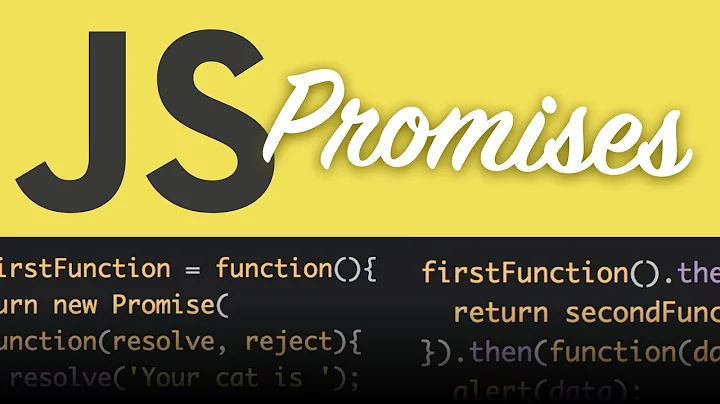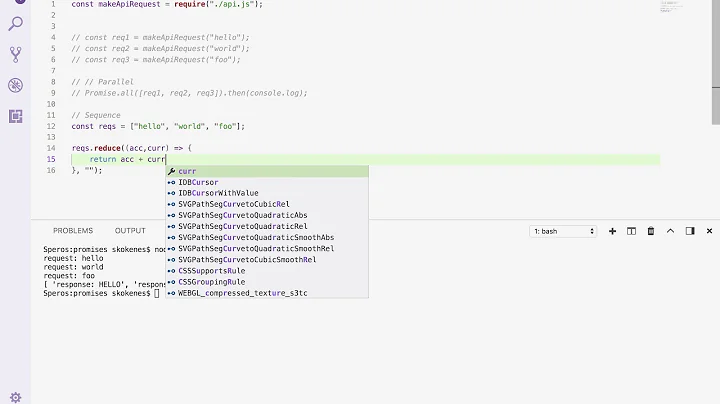How to pass parameter to a promise function
162,153
Solution 1
Wrap your Promise inside a function or it will start to do its job right away. Plus, you can pass parameters to the function:
var some_function = function(username, password)
{
return new Promise(function(resolve, reject)
{
/*stuff using username, password*/
if ( /* everything turned out fine */ )
{
resolve("Stuff worked!");
}
else
{
reject(Error("It broke"));
}
});
}
Then, use it:
some_module.some_function(username, password).then(function(uid)
{
// stuff
})
ES6:
const some_function = (username, password) =>
{
return new Promise((resolve, reject) =>
{
/*stuff using username, password*/
if ( /* everything turned out fine */ )
{
resolve("Stuff worked!");
}
else
{
reject(Error("It broke"));
}
});
};
Use:
some_module.some_function(username, password).then(uid =>
{
// stuff
});
Solution 2
Another way(Must Try):
var promise1 = new Promise(function(resolve, reject) {
resolve('Success!');
});
var extraData = 'ImExtraData';
promise1.then(function(value) {
console.log(value, extraData);
// expected output: "Success!" "ImExtraData"
}, extraData);Solution 3
Even shorter
var foo = (user, pass) =>
new Promise((resolve, reject) => {
if (/* condition */) {
resolve("Fine");
} else {
reject("Error message");
}
});
foo(user, pass).then(result => {
/* process */
});
Solution 4
You can return your promise in a function with arguments. Like this:
function someFunction(username, password) {
return new Promise((resolve, reject) => {
// Do something with the params username and password...
if ( /* everything turned out fine */ ) {
resolve("Stuff worked!");
} else {
reject(Error("It didn't work!"));
}
});
}
someFunction(username, password)
.then((result) => {
// Do something...
})
.catch((err) => {
// Handle the error...
});
Solution 5
You can use .bind() to pass the param(this) to the function.
var someFunction =function(resolve, reject) {
/* get username, password*/
var username=this.username;
var password=this.password;
if ( /* everything turned out fine */ ) {
resolve("Stuff worked!");
} else {
reject(Error("It broke"));
}
}
var promise=new Promise(someFunction.bind({username:"your username",password:"your password"}));
Related videos on Youtube
Comments
-
kundante almost 2 years
this might seem a silly question but I am a newbie in this topic. I am working on promises on node js. And I want to pass parameter to a promise function. However I could not figure it out.
someModule.someFunction.then(username, password,function(uid) { /*stuff */ }and the function is something like
var someFunction = new Promise(username, password, function(resolve, reject) { /*stuff using username, password*/ if ( /* everything turned out fine */ ) { resolve("Stuff worked!"); } else { reject(Error("It broke")); } });-
 adeneo about 8 yearsThere's no reason to do that, you can just define
adeneo about 8 yearsThere's no reason to do that, you can just defineusernameandpasswordin a higher scope -
kundante about 8 yearsBut I am calling the promise from another module, and also username and password are not static but coming from client-side. Is it safe to define somekind of gloabal variable that one function sets and the other one uses. Is there a risk that the variable is changed by another client?
-
SLaks about 8 years@kundante You don't need any globals. Learn about closures.
-
Mawg says reinstate Monica about 5 years@adeneo the promise is async - what if he invokes the function a second time before the first promise is resolved ?
-
hannodb over 3 years@adeneo - Please don't answer questions with "There is no reason to do that". You don't know that, and it's a really annoying response. The person might have specific reasons why he wants to do something a specific way which he didn't necessarily felt relevant to explain. Either it can be done, or it can't, and if it is a bad idea you can list the reasons. Clearly, as the answer with 248 upvotes below demonstrate, it can be done, and there is lots of reason to do it.
-
 adeneo over 3 years@hannodb - Sure, but in this case the answer is to actually declare the variables in a higher scope, either as arguments, or declared directly, it's the only simple viable solution as
adeneo over 3 years@hannodb - Sure, but in this case the answer is to actually declare the variables in a higher scope, either as arguments, or declared directly, it's the only simple viable solution asPromise.thenonly has two arguments, none of them being user selectable. The accepted answer also declares the variables in a higher scope, which should tell you it was exactly what the OP wanted.
-
-
user5389726598465 about 6 yearsYour example would be better if you resolve with an array or object that you deconstruct so multiple arguments are shown and the verbose promise is created already resolved like so: Promise.resolve([arg1, arg2, arg3]);
-
 Si8 over 5 yearswhat is
Si8 over 5 yearswhat issomeModule? -
Shanoor over 5 yearsIt's just an example from the OP
-
Shakiba Moshiri almost 5 yearsI think it is wrong since the second parameter which is passed to
thenis a callback for handling the return value of reject function. Instead ofresolve('Success!');tryreject('Error');We will get error:Unhandled promise rejectionHere we see the output becausevar extraData = 'ImExtraData';is a global variable and NOT because of passing it usingthen -
 sadiq almost 5 yearsIf you do not pass it you can't access it as it has not scope in promise/then if you do not pass it.
sadiq almost 5 yearsIf you do not pass it you can't access it as it has not scope in promise/then if you do not pass it. -
Shakiba Moshiri almost 5 yearstry to remove it and see if it works or not? codepen.io/k-five/pen/ZNOvKG see the console log in the your browser
-
 sadiq almost 5 yearsI appreciate your codepen, but use two different variables and then see the real factor! AVOID the SAME VARIABLE. If just the global variable worked fine we did not need to pass extra parameter.
sadiq almost 5 yearsI appreciate your codepen, but use two different variables and then see the real factor! AVOID the SAME VARIABLE. If just the global variable worked fine we did not need to pass extra parameter. -
 DevAS almost 5 yearsi have this function how to edit it to accept
DevAS almost 5 yearsi have this function how to edit it to accept.then()when i invoke it in a Button ` SaveImagesToFirebase = () => { const uid = firebase.auth().currentUser.uid; // Provider const { images } = this.state; images.map(image => { let file = image.uri; console.log(file); const path = "Img" + Math.floor(Math.random() * 1500); console.log("@IMAGE", path); const ref = firebase .storage() .ref(provider/${uid}/ProviderGalary/${path}); ref.put(file); }); };` @gogog -
gogog almost 5 years@DevAS <button onclick="then_function(SaveImagesToFirebase.bind(this))"></button> script is ` var then_function=function(promise){new Promise(promise).then(function(e){/*code*/})}; function SaveImagesToFirebase(resolve,reject){/*code*/ resolve(/*???*/);}`
-
 Old Geezer almost 5 years@Shanoor What is
Old Geezer almost 5 years@Shanoor What isuid? Is it the string "Stuff worked!"? -
Shanoor almost 5 years@OldGeezer, it's just a variable to hold the return from the promise. In this case, yes, that would be "Stuff worked!".
-
 TimeParadox almost 4 yearsdo you know how to call a function from the parent class within the new promise ?
TimeParadox almost 4 yearsdo you know how to call a function from the parent class within the new promise ? -
Daweb over 3 yearsExactly what I was looking for : to separate my functions so you don't need to wrap a anonymous function in your promise
function f2(resolve, reject){ console.log('executing with params : ', this); setTimeout(() => resolve("done!"), this.delay) }; async function f1(data) { // process data here console.log('before'); let promise = new Promise(f2.bind(data)); let result = await promise; // wait until the promise resolves console.log('after'); // process result here alert(result); // "done!" } const data = {delay: 1000}; f1(data); -
 Abilogos about 3 yearshi Jermine, it would be better to add some description to your answer.
Abilogos about 3 yearshi Jermine, it would be better to add some description to your answer.








